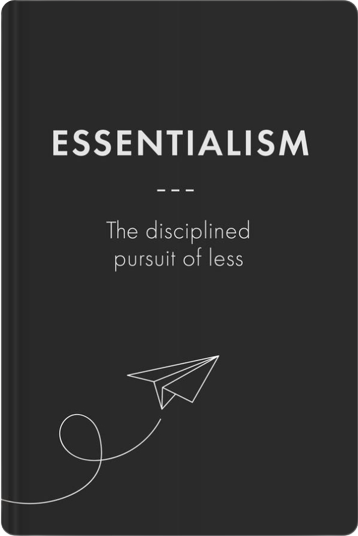It’s difficult to set priorities straight when swamped with tasks and responsibilities. Adopting essentialism can help pinpoint what is most important and increase productivity and fulfillment. Focus on a few vital things and do better by doing less. Question yourself regularly and update plans accordingly. Essentialism is a way of life that requires regular practice and discipline.
Takeaways
Essentialism: Focusing on What Truly Matters
- Our lives are filled with tasks and responsibilities, making it difficult to set priorities and identify what is most important.
- Essentialism involves focusing on a few important tasks and cutting out trivial things to improve productivity.
- The four main points of Essentialism are: do less but do it better, discard the idea of accomplishing everything, make giant strides in the things that matter most, and regularly question yourself and update plans.
- By constantly evaluating the worth of your actions and investing time in what truly matters, you can become an essentialist and achieve greater success.
The Power of Choice: Avoiding Learned Helplessness
If you give up your power to choose, you essentially give others permission to choose for you.
- Learned helplessness can occur when we feel unable to control our environment or situation, leading to feelings of powerlessness and passivity.
- In an experiment with dogs, those who were given a lever that could stop the shocks learned to control their environment and avoid the shocks, while others learned to be helpless and did not adapt.
- Similarly, in life, when we forget our ability to choose, we can become passive and feel as though our lives are controlled by others. This is the non-essential lifestyle. –
- Essentialists, however, embrace the power of choice and never give up their right to choose, even in difficult circumstances. By recognizing the power of choice, we can avoid learned helplessness and take control of our lives.
Doing Less and Embracing Trade-Offs
- Southwest Airlines achieved success by focusing on doing one thing very well: flying people from one point to another, with no frills necessary.
- They understood that trying to do everything would lead to failure.
- Continental Airlines tried to copy Southwest’s strategy but failed because they couldn’t let go of the nonessential and concentrate on what was vital.
- Embracing the idea of doing less and accepting trade-offs is a key principle of Essentialism.
- Making trade-offs can be difficult when we convince ourselves that we can do it all.
- Doing less and accepting trade-offs can lead to greater success in life.
Escape and See the Bigger Picture
Most times, people get so lost in the petty, day-to-day tasks that they forget the reason they are doing those things in the first place.
- Modern technologies make it hard to be bored, but boredom can be good for you.
- Clearing a break in your schedule daily can give you time to escape and think clearly about what you have to do.
- Successful people like Isaac Newton, Albert Einstein, and CEOs schedule “blank space” in their calendars to do some thinking.
- Escaping can help separate essential responsibilities from the rest and keep you focused on the bigger picture.
- Keeping a journal and writing as little as possible can help you sift out only what you deem essential and see the big picture surface.
The Importance of Play and Rest for Productivity
- Adults tend to view play as trivial and unproductive, but essentialists recognize that play is an indispensable tool for inspiration.
- Play helps us form new connections between ideas, is a remedy for stress, and helps us prioritize our responsibilities.
- Companies like Twitter, Pixar, and Google promote play to inspire and increase productivity.
- However, play should never take priority over rest and sleep.
- Non-essentialists view sleep and play as a luxury, but sleep enhances thinking and productivity during active hours.
- Research at Harvard found that going 24 hours without sleep or getting an average of about five hours of sleep each night results in cognitive impairment equal to a 0.1% blood alcohol level.
Strict Criteria for Cutting Out Non-Essential Things
- We often think that all tasks and responsibilities are essential, making it hard to cut out the non-essential.
- To avoid this mistake, be strict with your criteria.
- Use the 90% rule: have a scoring system from 0 to 100, anything below 90 is a 0 and should be discarded.
- Another approach is to conclude that “if it isn’t a clear yes, then it’s a clear no.”
- List three minimum requirements and three ideal criteria for something to keep it.
- This approach helps avoid letting trivial matters slip through.
Title: “Saying No and Planning for Essential Tasks”
- Saying “no” can be difficult, but it’s necessary to reserve “yes” only for the things that really matter.
- Treat the decision and the relationship as separate entities.
- The pain of saying “no” may last for only 10 minutes, while saying “yes” to non-essential tasks can result in longer-lasting regret.
- Once you’re used to saying “no,” focus on planning the remaining vital tasks.
- Get clear on your goals by having an essential intent: one primary objective that is both concrete and inspirational.
- Make sure your goal is clear by asking yourself, “How will I know when I’ve reached my goal?”
Withdraw from Failures and Set Boundaries
“Only when we admit we have made a mistake in committing to something can we make a mistake a part of our past.”
Greg McKeown
- Sunk-cost bias is the tendency to keep investing in something that is not likely to succeed, making it difficult to let go and increasing the amount that will be lost.
- Avoid this trap by admitting flaws and mistakes and letting them go.
- Setting clear boundaries can also prevent sunk-cost bias and make life easier and more enjoyable.
- Boundaries are liberating, not constraining.
- For example, setting a clear boundary between work and family can help maintain a healthy work-life balance.
Eliminate What Slows You Down
- Essentialism requires eliminating what’s slowing you down, not just finding ways to work around it.
- The essentialist solution is to carefully prepare and eliminate the problem.
- For example, in a boy scout troop, taking off provisions from slower kids’ backpacks and putting them in faster kids’ backpacks eliminates the problem of some scouts being faster than others.
Action Items
- Start implementing essentialism by focusing on a few important tasks and cutting out trivial things to improve productivity. Regularly question yourself and update plans accordingly.
- Set clear boundaries to prevent sunk-cost bias and make life easier and more enjoyable. Admit flaws and mistakes and let them go to avoid investing time in something that is not likely to succeed.
- Say “no” to non-essential tasks and focus on planning the remaining vital tasks. Get clear on your goals by having an essential intent: one primary objective that is both concrete and inspirational. Make sure your goal is clear by asking yourself, “How will I know when I’ve reached my goal?”

